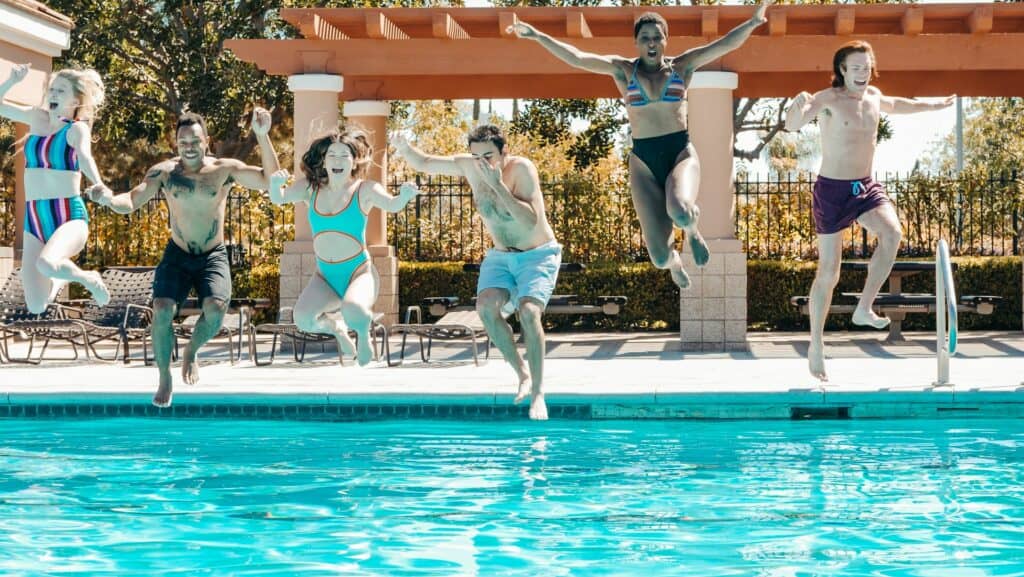During the long, lazy days of summer, there’s really nothing better than relaxing at the pool. For those who live in a homeowners association (HOA), pool access is often one of the foremost benefits. For as nice as it is to have a community pool, however, HOA Board members have their work cut out for them as they try to keep the pool area safe and usable. There’s swimming pool maintenance, of course, but also swimming pool security.
How can your HOA Board put a pool security plan in place, ensuring the safety of your residents and keeping the pool area free from any kind of vandalism? Consider a few basic tips and strategies for swimming pool security.

Security Measures for Your HOA Swimming Pool Area
1) Ensure proper gating and fencing.
One of the most basic ways to protect the safety of your members, and the security of your pool area, is to make sure you have a perimeter fence with a locked gate, keeping the entire area off-limited to unauthorized guests. A good fence will also prevent kids from accidentally wandering too close to the pool and falling in.
Note: This step is really non-negotiable for HOAs in the Carolinas, where local laws require that swimming pools be properly gated.
2) Install access control systems.
Residents enjoy being able to visit the pool whenever they like (at least during normal pool hours). The issue is when unauthorized people show up. This can lead to overcrowding, as well as issues with vandalism or even theft.
One way to ensure security at your pool area is to put an access control at the point of entry, ensuring that only members of your homeowners association are able to enter the pool. A system to control access is a great way to make your pool gates maximally effective.
But what are the best forms of access control? You can always install an entry door that requires an access code to enter, but an even better option is to require residents to swipe a card or key fob in order to enter. You can use the same card and fob system in all common areas, including the fitness center, locker rooms, etc., to maximize convenience.
3) Put cameras in place.
As you consider security measures for your HOA swimming pool, we would also recommend that you put security cameras in place. We recommend security cameras for a few reasons:
- By making your cameras visible, you can use them to deter folks who might otherwise be tempted to break in for acts of vandalism or theft.
- Cameras can also be helpful for collecting evidence about any security breaches or unauthorized access, which can be used to prosecute burglars or vandals.
- In the event of a tragic accident, security camera footage can be valuable as you assess the safety equipment on-hand near your pool.
4) Think about hiring security guards.
Most HOAs never reach a point where they need security guards to patrol common areas, such as the parking lot or the swimming pool. If you do think that patrolmen would be useful in securing your pool, and in promoting peace of mind among homeowners, that’s certainly a viable option. Your association management company can likely recommend some good local security teams that can advise you further.
5) Keep the right safety equipment on hand.
Pool security isn’t only about prohibiting unauthorized access. It’s also about being sure that the men, women, and children who use your pool are safe at all times. As such, your security plan should include provisions for life-saving equipment, well-stocked around the pool. For instance, consider placing First Aid kits, personal flotation devices, rescue tubes, rescue hooks, and more.
Note: It’s important not only to stock these items, but to have someone in charge of checking them every so often, making sure all your safety equipment is still in good working order.

6) Place clear signage.
You’ll also want to make sure that homeowners who do access your pool are well aware of any important safety guidelines. There are tons of examples here:
- Rules prohibiting running near the pool area.
- Rules prohibiting diving.
- Reminders to leave the pool area at the first hint of lightning.
- A notice that there is no lifeguard on duty.
Make sure signs are clearly posted where any visitors to your community pool can see them. Not only can these signs promote safety, but they are also important legal liability shields.
7) Be attentive to pool maintenance.
If your HOA has its own pool, then it’s important to be diligent about maintenance. That means regularly checking the chemical levels to ensure they are balanced, adding new chemicals and “shocking” the pool whenever it’s needed.
This pertains to safety because if you allow the water quality to decline, and if swimmers accidentally ingest it, it could make them sick. This can be avoided through simple maintenance. Again, you can reach out to your association management company if you need the name of a dependable local pool company to help you.
8) Communicate with homeowners.
As a member of the HOA Board, you play an important role in developing pool safety policies. However, those policies don’t mean much if homeowners are not kept in the loop. As such, we recommend communicating with residents about new pool rules or safety measures as they are developed. Also send out reminders at the start of each swimming season.
9) Lead by example.
A simple point: As a member of the Board, you can promote safety simply by setting a good example to your friends and neighbors. Be sure to always abide by stated pool rules and policies, and encourage others to do likewise.
10) Work with your HOA management company.
A final note: Professional HOA management companies have plenty of experience working with HOA Board members to develop sound pool security measures. If you have any questions at all about how to secure your pool, don’t hesitate to reach out to your manager.
Contact Us to Talk Security
At Kuester Management Group, we are an HOA management company proudly serving HOA and condo associations in Charlotte, NC as well as Myrtle Beach. We have helped countless communities enact reasonable security measures, and we would love to do the same for you. To start the conversation with us, reach out at any time. We’d love to walk you through the best ways to keep your members, as well as your common areas, safe and secure.

